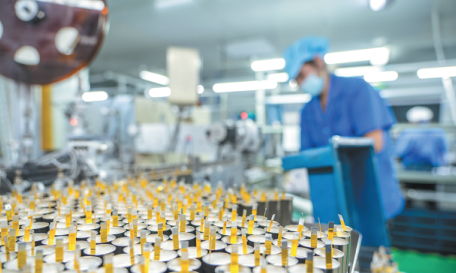SW China's Guizhou sets sights on booming NEV battery and materials industry


A view of a lithium battery manufacturing base in Bijie, Southwest China's Guizhou province, in August 2022. [LUO DAFU/FOR CHINA DAILY]
Southwest China's Guizhou province is harnessing its abundant resources and industrial prowess to bolster the development of batteries for the fast-growing new energy vehicle sector.
The province has established lithium battery material industry clusters represented by the Dalong Economic and Technological Development Zone in Tongren and the Guiyang National High-tech Industrial Development Zone, nurturing renowned companies like Guizhou Anda Energy Technology Co Ltd.
According to the local government, the total output value of companies whose annual revenue surpasses 20 million yuan ($2.8 million) each in Guizhou's NEV battery and materials industry, surged to 53.2 billion yuan in 2022, and is expected to exceed 100 billion yuan this year.
This was barely 12 billion yuan in 2020.
Guizhou Anda Energy Technology was the first from the province to be listed on the Beijing Stock Exchange. The company has capitalized on the growth of the NEV sector, transforming from a traditional phosphorus chemical producer to a new energy material manufacturer, significantly increasing its product value.
This transition has earned the company a place on a list of "little giant" firms, or novel and elite small and medium-sized enterprises that specialize in a niche market, boast cutting-edge technologies, and show great potential.
"Founded in 1996 as Anda Phosphorus Chemical, the company faced challenges in its traditional business due to low added value of products and limited scale. However, we saw the rise of the NEV industry, decided to seize the opportunity and became one of the earliest companies that started the research and development of lithium iron phosphate materials – a battery material," said Liu Jianbo, chairman of the company.
Guizhou Anda Energy Technology primarily focuses on the research and development, production and sales of products made of iron phosphate and lithium iron phosphate. Its products are widely used in the fields of NEV batteries and energy storage batteries. The company is a major supplier to well-known domestic lithium battery manufacturers like BYD, CALB and Sunwoda.
The company has an annual production capacity of 150,000 metric tons for lithium iron phosphate, with total assets of nearly 5.5 billion yuan and net assets of 2.7 billion yuan. Last year, the company generated 6.5 billion yuan in revenue and 810 million yuan in profit.
"With intensifying competition from the new technological revolution and increasing demand for enhancing the stability and competitiveness of industrial supply chains, companies like Guizhou Anda Energy Technology are fully embracing new development opportunities. With strong government support, we are increasing research and development investments and technological upgrades, focusing on the development of specialized and innovative products," Liu said.
The achievements of Guizhou Anda Energy Technology are a reflection of the rapid growth of Guizhou's new energy battery and materials industry.
The Guizhou Qiannan High-tech Industrial Development Zone, located in south Guizhou, has attracted an increasing number of new energy battery and materials production companies due to its abundant phosphorus ore resources and strong industrial foundation.
"We were attracted by the region's strong industrial foundation and the ability to recycle industrial waste," said Chen Shaowen, an executive of Shengtun Energy Metal Chemical (Guizhou) Co Ltd, a local company specializing in the production of new energy materials.
While byproducts like sulfuric acid from phosphorus chemical production are challenging to manage elsewhere, sulfuric acid is efficiently utilized on-site here, Chen added.
To support the development of the new energy battery and materials industry, Guizhou has invested 10 billion yuan to establish an industrial development fund. It has also allocated 1 billion yuan in provincial-level special financial funds to support infrastructure construction for six key industrial parks and 20 crucial projects in the new energy battery and materials industry.
A new energy material innovation center has also been founded at the provincial level, focusing on surpassing key technical barriers in areas like phosphorus and fluorine, to drive industrial transformation and upgrade.
MOST POPULAR
Editors' Picks
 Infographic:
China's 5G subscriptions hit a new milestone
Infographic:
China's 5G subscriptions hit a new milestone
 Database:
China Economic Data Tracker
Database:
China Economic Data Tracker
 Infographic:
China extends visa-free transit to 240 hours
Infographic:
China extends visa-free transit to 240 hours




